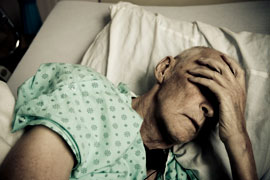Help Us Understand Fatigue Related to Cancer


Researchers at the National Institutes of Health (NIH) are conducting a study to understand fatigue in people with cancer. Fatigue is a common side effect of cancer and its treatment — 96% of cancer patients report experiencing it. However, fatigue is difficult to treat because its cause is poorly understood. Research has indicated that cancer-related fatigue may be caused by a number of factors, including immune system response to treatment. Your participation can help investigators better understand cancer related fatigue. Although, there is no compensation for participation, travel assistance to and from study visits may be available.
What is involved?
- There are three study visits with the research team
- You will be asked to answer questionnaires about fatigue, depression, and quality of life
- You will be asked to provide a blood sample
You may be eligible if you:
- Are 18 or older
- Have cancer, receiving cancer treatment,or you are a cancer survivor
You may NOT be eligible if you:
- Have any other serious medical problems or take medications that cause fatigue
- Have any infectious diseases such as HIV or hepatitis
- Have chronic inflammatory disease
- Have a current or past history of major psychiatric problems within the last 5 years
The NIH Clinical Center, America's Research Hospital, is located in Bethesda, MD. Metro red line (Medical Center stop).
For more information:
NIH Clinical Center Office of Patient Recruitment
800-411-1222
(TTY users dial 7-1-1)
Email: ccopr@nih.gov
Or go online:
https://go.usa.gov/xGcgw
Refer to study # 11-NR-0014
Department of Health and Human Services
National Institutes of Health Clinical Center (CC)
National Institute of Nursing Research (NINR)
